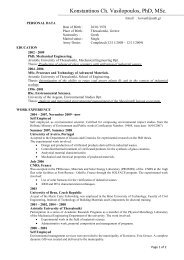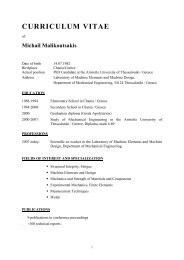international cooperation in education - Laboratory of Heat Transfer ...
international cooperation in education - Laboratory of Heat Transfer ...
international cooperation in education - Laboratory of Heat Transfer ...
You also want an ePaper? Increase the reach of your titles
YUMPU automatically turns print PDFs into web optimized ePapers that Google loves.
Source: A. Avdelas photo archive<br />
The ATHENS<br />
European Network<br />
Created <strong>in</strong> 1996, the Advanced Technology Higher Education Network/Socrates<br />
(“ATHENS”) consists <strong>of</strong> 15 European technological universities and<br />
<strong>in</strong>stitutions: the Universities and Technical Institutions <strong>of</strong> BME Budapest,<br />
ITU Istanbul, TU Delft, KU Leuven, IST Lisbon, UCL Louva<strong>in</strong>-la-Neuve, UP Madrid,<br />
Politecnico Milan, TU Munich, CTU Prague, AUTh Thessaloniki, NTNU Trondheim,<br />
TU Wien, Warsaw UT, and 9 <strong>of</strong> the 11 <strong>in</strong>stitutes <strong>of</strong> ParisTech “Grandes Écoles<br />
d’Ingénieurs de Paris” (AGROPARISTECH, AGROPARISTECH/ENGREF, ENPC,<br />
ENSAM, ENSCP, M<strong>in</strong>es ParisTech, Télécom ParisTech, ENSTA, and ESPCI). The<br />
School <strong>of</strong> Eng<strong>in</strong>eer<strong>in</strong>g <strong>of</strong> the Aristotle University has been a member <strong>of</strong> ATHENS<br />
s<strong>in</strong>ce December 2007.<br />
The pr<strong>in</strong>cipal goal <strong>of</strong> the Network is to facilitate the exchange <strong>of</strong> students, pr<strong>of</strong>essors,<br />
and researchers among the major European technological universities,<br />
so that they can participate together under European technological development<br />
and tra<strong>in</strong><strong>in</strong>g programmes.<br />
One <strong>of</strong> the Network’s first and most unique actions concerns the organisation<br />
<strong>of</strong> an <strong>in</strong>tensive course given at each member <strong>in</strong>stitution dur<strong>in</strong>g one <strong>of</strong> two<br />
def<strong>in</strong>ed periods (“Sessions”) <strong>of</strong> the academic year (November and March). This<br />
tra<strong>in</strong><strong>in</strong>g activity is called ATHENS (Advanced Technology Higher Education Network/SOCRATES).<br />
Each Session <strong>in</strong>cludes 30 hours <strong>of</strong> scientific courses, as well as 10 to 15 hours<br />
<strong>of</strong> “European Dimension” activities. At the end <strong>of</strong> an ATHENS Session, the Home<br />
Institution <strong>of</strong>ficially recognises the work carried out accord<strong>in</strong>g to the results ob-<br />
>>><br />
’’ATHENS’’ students<br />
visit the Archeological<br />
Museum <strong>of</strong><br />
Thessaloniki.<br />
by Aris Avdelas,<br />
pr<strong>of</strong>essor, Department<br />
<strong>of</strong> Civil Eng<strong>in</strong>eer<strong>in</strong>g,<br />
coord<strong>in</strong>ator <strong>of</strong> ATHENS for<br />
AUTh.<br />
│INTERNATIONAL COOPERATION IN EDUCATION│





